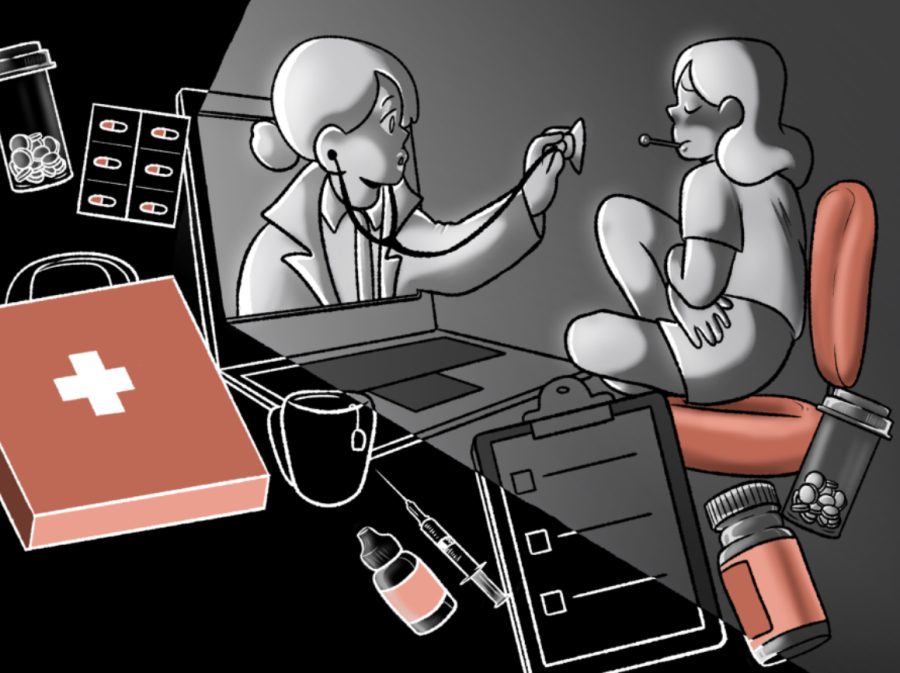Take advantage of UT’s gynecology clinic
November 9, 2022
Content Warning: This column contains discussion of struggles with body image and disordered eating.
Since I was little, I always struggled with my body image. I never liked the way my curls fell, my sporadic acne or the number on the scale. I would always cry before going to the doctor and beg my mother not to go. I knew hearing the dreaded words of my doctor saying I was “overweight” would cause me to not eat for a week. At the time, my relationship with my health was all about how I looked.
Because my mom was a teen mother, she always talked to me about my body, contraception and women’s health. She intended to educate me because the 10-minute sex education video I saw in middle school wasn’t enough, but I still felt embarrassed. It was to the point that I would become upset by these random conversations with my mom. The societal shame women are conditioned to feel deeply impacted my relationship with my body.
From a young age, girls are taught to feel embarrassed about how their bodies look and operate. The shame is only magnified when girls begin to go through bodily changes during puberty.
I began to feel more comfortable with my body as I grew older. However, when I started dating in my junior year of high school, I realized I had to confront the internal trauma I held throughout my childhood. It was a long journey to feel comfortable honoring my body and making decisions in my best interest. In my freshman year of college, after countless conversations with my partner about contraception, I finally felt comfortable enough to speak with a doctor about my reproductive health and my options moving forward.
I set up an appointment at the Gynecology Clinic at University Health Services out of convenience, and I was shocked by how quick and easy the process was. When I met with my doctor, I was so nervous that I was visibly shaking, but she quickly reassured me that everything was OK. That was the first time in my life I actually felt safe in a doctor’s presence.
Barbara Blizzard, professional nurse practitioner and chief of women’s health at UHS and the Counseling and Mental Health Clinic, describes the clinic’s goal to support students through their health care needs.
“Our goal is to support their academic goals. Contraception sometimes is a good part of that,” Blizzard said. “Because that lets them focus on their academic part, and not have to worry about an unplanned pregnancy. So it’s important that we still continue to provide contraception and we’re serious about that.”
Not every gynecologist is a good one. With this in mind, some women would rather suffer in silence rather than go to a gynecologist. This is why Blizzard recommends students go to the UHS Gynecology Clinic, it offers a safe and convenient place for students’ first time.
“Many of our students don’t have a person they’ve seen for gynecological care before. So we’re the ones that sort of have that first step they make in meeting every source for gynecology needs,” Blizzard said.
The stigma around women’s bodies prevents some from going to the gynecologist in times of need, and this has many consequences on women’s health in America. This shame does not just impact young women. Studies show that most women are not aware of how their reproductive organs work.
The Supreme Court’s decision to overturn Roe V. Wade was a decision that severely limited reproductive rights in America — only adding to the social and cultural shame of women’s bodies throughout history. In the wake of Texas’ abortion ban, many are wondering if birth control is next to be banned.
In college, students need close, convenient options to ensure they have access to preventive care. The UHS Gynecology Clinic continues to offer access to contraception, making the service more important than ever.
Jordan Torres, human development and family sciences junior, booked an appointment at the gynecology clinic to renew her birth control. She was surprised by the difference from when she initially met with her physician to get on birth control in high school.
“When I first went on birth control in high school, I was 15. (Physicians) just want to make sure you’re making the right decisions, so they definitely ask a lot of questions. … One difference I saw with my appointment from UT’s clinic is I’m 20, so they don’t interrogate like before,” Torres said.
Facilities like UT’s gynecology clinic prioritize the wellness of women, regardless of the state’s legislation. With this in mind, if you are indecisive on whether you should get checked out, you should book an appointment at the UHS Gynecology Clinic. Push back against society’s pressure and take care of your health.
DuBois is a public relations and sociology sophomore from Killeen, Texas.















